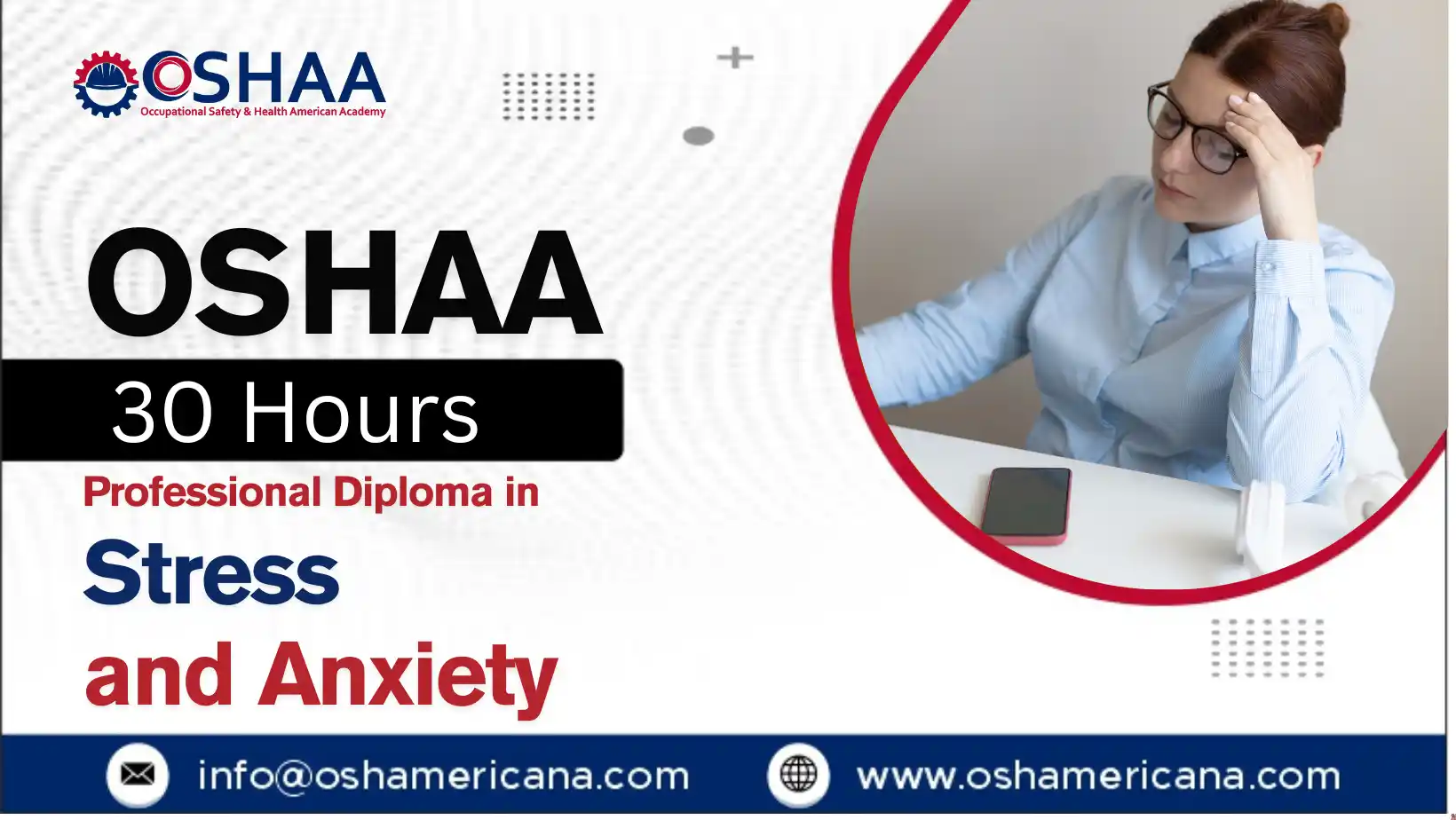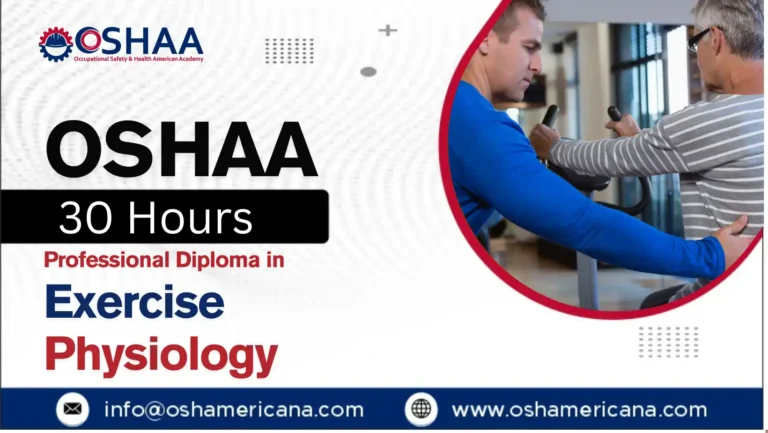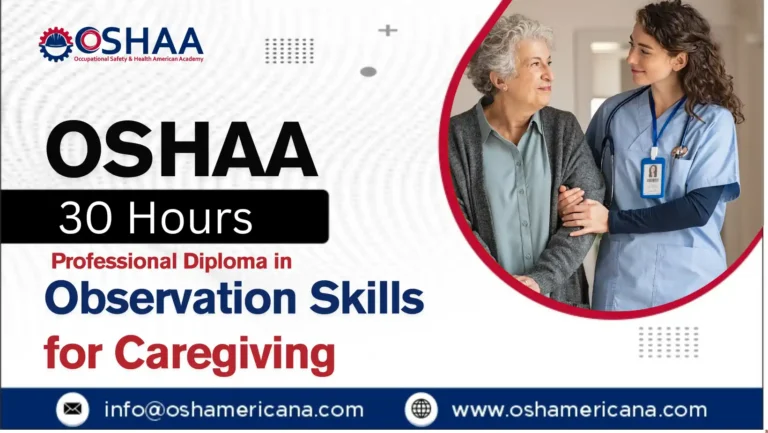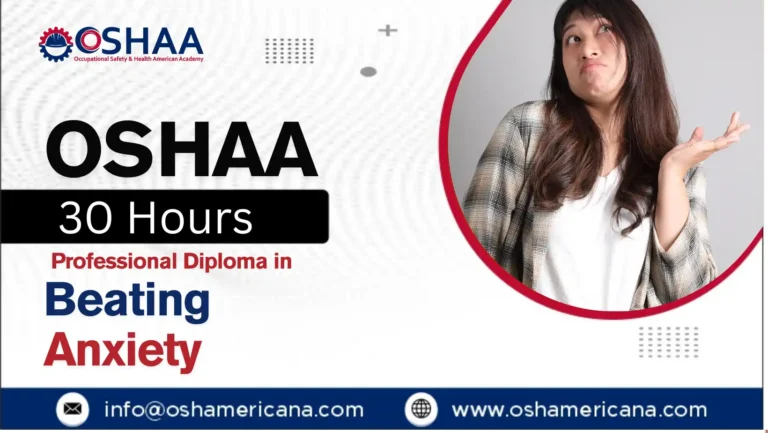In today’s fast-paced and demanding world, stress and anxiety have become increasingly common challenges impacting mental, emotional, and even physical health. Understanding how to recognise, manage, and support others through these conditions is more important than ever. The OSHAA 30-Hours Professional Diploma in Stress and Anxiety has been professionally designed to provide participants with in-depth knowledge of the causes, effects, and evidence-based strategies for addressing stress and anxiety in various settings.
Structured across 30 hours of guided learning, this diploma offers a comprehensive understanding of stress and anxiety, their underlying mechanisms, and the tools required to manage them effectively. Participants explore the psychological, physiological, and behavioural dimensions of these conditions, supported by real-life case examples, clinical insights, and self-help models.
This diploma empowers participants with practical and research-backed tools to understand and manage stress and anxiety, both personally and in support of others. It builds confidence in recognising early signs of mental distress and responding appropriately within one’s professional scope.
Participants gain a deeper awareness of how everyday pressures impact mental health, and how to apply structured approaches to reduce anxiety, improve resilience, and support a calmer, more balanced lifestyle. The course offers valuable insights into self-care as well as care for others, enhancing both personal growth and professional effectiveness.
The OSHAA 30-Hours Professional Diploma in Stress and Anxiety offers a professionally guided, accessible, and highly relevant qualification for anyone wishing to better understand and address the growing impact of stress and anxiety in modern life. Through this course, participants can build the knowledge and confidence to support healthier minds—both their own and those around them.
OSHAA 30-Hours Professional Diploma in Stress and Anxiety
Study Units
Learning Outcomes
Introduction to Stress and Anxiety: Definitions and Distinctions (3 hours)
- Define stress and anxiety within psychological and clinical frameworks
- Distinguish between normal stress responses and anxiety disorders
- Understand the relevance of short-term versus long-term stress
- Identify different types of anxiety, including generalised, social, and situational forms
Psychological and Physiological Effects of Stress (3 hours)
- Describe how stress affects the body’s nervous, cardiovascular, and immune systems
- Explain the role of the brain and hormonal responses in stress regulation
- Understand the link between prolonged stress and physical health conditions
- Identify signs of emotional and psychological strain resulting from stress
Common Causes and Triggers of Anxiety and Chronic Stress (6 hours)
- Recognise environmental, social, and personal stressors
- Explore the role of trauma, life changes, and daily pressures as triggers
- Understand how personality traits and coping styles influence anxiety risk
- Analyse workplace, academic, and relationship-related stressors
- Examine the influence of media, technology, and societal expectations
- Identify the cumulative impact of chronic low-level stress
Cognitive, Emotional and Behavioural Symptoms (3 hours)
- Identify common thought patterns associated with stress and anxiety
- Understand emotional responses such as fear, worry, and irritability
- Describe behavioural changes such as avoidance, restlessness, and compulsive habits
- Recognise how symptoms affect daily functioning and interpersonal relationships
Assessment and Early Identification Techniques (3 hours)
- Learn how to observe and assess signs of stress and anxiety in oneself and others
- Use structured tools and informal methods for early detection
- Understand when to seek further professional intervention
- Apply basic mental health screening questions in a non-clinical setting
Cognitive Behavioural Strategies for Stress and Anxiety Management (4 hours)
- Understand the principles of cognitive behavioural therapy (CBT)
- Identify how thoughts, emotions, and behaviours are interconnected
- Practise basic CBT-based techniques for thought challenging and reframing
- Apply CBT approaches to everyday stress and anxiety scenarios
Mindfulness, Relaxation and Breathing Techniques (6 hours)
- Explore the benefits of mindfulness for emotional regulation
- Practise breathing exercises to reduce physiological stress responses
- Understand the role of guided imagery, progressive muscle relaxation, and grounding
- Incorporate mindfulness techniques into daily routines
- Evaluate the effectiveness of various relaxation methods
- Create a personalised self-care toolkit for anxiety reduction
Lifestyle Interventions: Sleep, Nutrition and Physical Activity (2 hours)
- Understand how sleep quality influences mental health and stress resilience
- Recognise the role of balanced nutrition in emotional wellbeing
- Explore the mental health benefits of regular physical activity
- Recommend sustainable lifestyle habits to support stress management
Course Benefits: OSHAA 30-Hours Professional Diploma in Stress and Anxiety
- Equips participants with a clear understanding of the psychological and physiological mechanisms behind stress and anxiety
- Enhances the ability to recognise early warning signs and symptoms in oneself and others
- Provides evidence-based tools and strategies for managing stress and anxiety in everyday life and professional settings
- Introduces participants to cognitive behavioural techniques for reframing negative thought patterns
- Develops practical skills in mindfulness, relaxation, and breathing methods to reduce anxiety and promote calm
- Encourages the adoption of healthy lifestyle habits that support emotional and mental wellbeing
- Builds confidence in offering informed, ethical support to individuals experiencing emotional distress
- Strengthens professional competence in a range of fields including health, education, care, and workplace wellbeing
- Supports personal growth and resilience by promoting self-awareness and proactive mental health care
- Offers a recognised qualification aligned with UK standards, adding value to career development and wellbeing-focused roles
The OSHAA 30-Hours Professional Diploma in Stress and Anxiety is designed for participants who wish to gain a thorough and practical understanding of how stress and anxiety affect individuals across various settings. It is particularly suitable for:
- Professionals in healthcare, education, and social care who support others’ mental wellbeing
- Workplace managers and HR personnel responsible for employee welfare and performance
- Coaches, mentors, and counsellors seeking to strengthen their mental health awareness
- Family support workers and those in community or youth services
- Participants interested in improving their own resilience and emotional self-management
- Individuals considering a career in mental health, wellbeing, or emotional support services
No prior experience in psychology or therapy is required. The course welcomes participants from all backgrounds who are committed to enhancing mental wellbeing through informed, ethical, and practical approaches.







